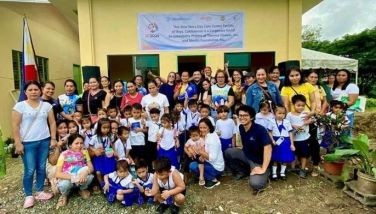Shell sponsors Project Tuklas with P100M scholarship program
MANILA, Philippines - Energy-saving cooking techniques come in handy when preparing food to make LPG tanks last longer or avoid incurring high electricity costs from overworked electric stoves.
Alternative cooking appliances like an induction stove and fuel like charcoal may also contribute to conserving energy. They may be more expensive than conventional electric stoves but cost-efficient in the long run. It uses low voltage to produce heat for cooking. Charcoal stoves now available in the market allow for mess-free and smokeless cooking at home.
Still in the developmental stage but holding promise are the electrocoal stove, charcoal made from home-made biomass chunks, and cooking fuel from janitor fish oil. These are actually projects of third year public high school students for an ongoing science and technology contest dubbed “Project Tuklasâ€. If proven feasible, the projects may not only be tools for conserving energy when cooking.
“There is a possibility that these little projects can support the development of renewable energies,†says Indonesian-Canadian Dwie Steffyanti, of international student organization AIESEC (Association Internationale des Etudiants en Sciences Economiques et Commerciales).
AIESEC organized Project Tuklas to find the brightest public high school students who can become future engineers. The Philippine Development Foundation (PhilDev) is offering engineering scholarships to student teams with the most innovative project conforming with the contest theme “Future of Energy.†Energy company Pilipinas Shell Petroleum Corp. (Shell) is sponsoring the contest and providing P100 million funding for the scholarship program.
Foreign mentors from AIESEC like Steffyanti are guiding the student teams in developing their prototypes and the presentation paper of their respective projects.
“We are doing something that can help not only design the future of energy but also improve the quality of life and make the world a better place to live,†says Brazilian Mateus Damiao, another AIESEC mentor for the student teams.
A team of students from the Holy Spirit National High School in Quezon City has the electro-coal, a two-burner charcoal stove, as their entry for the contest. The team is composed of Alexandra Nicole Perez, Charlyn Valentin and Marife Merijildo.
From the same school, a second team composed of Dennis Balanon, Maria Teresa Checa, Dianne Cubacub, Judy Jaramillo and Arnold Maizo are creating a charcoal using home-made biomass chunk.
The team of Celine Kate Trinidad, Paul Gabriel delos Santos, Karen Dones, Audrey Esporas and Abish Monterola from Marikina City’s Barangka National High School are creating a stove fuel out of the carcass of janitor fish, which is a source of biofuel.
The three teams are among the 32 teams from 18 public high schools in Metro Manila that are vying to win in Project Tuklas. The best three projects from each of four school groupings will be picked to compete in the finals round this year. All students of the teams that will qualify for the finals are also qualified to receive the engineering scholarship, which they will get if they pass the university entrance exam.
- Latest





























